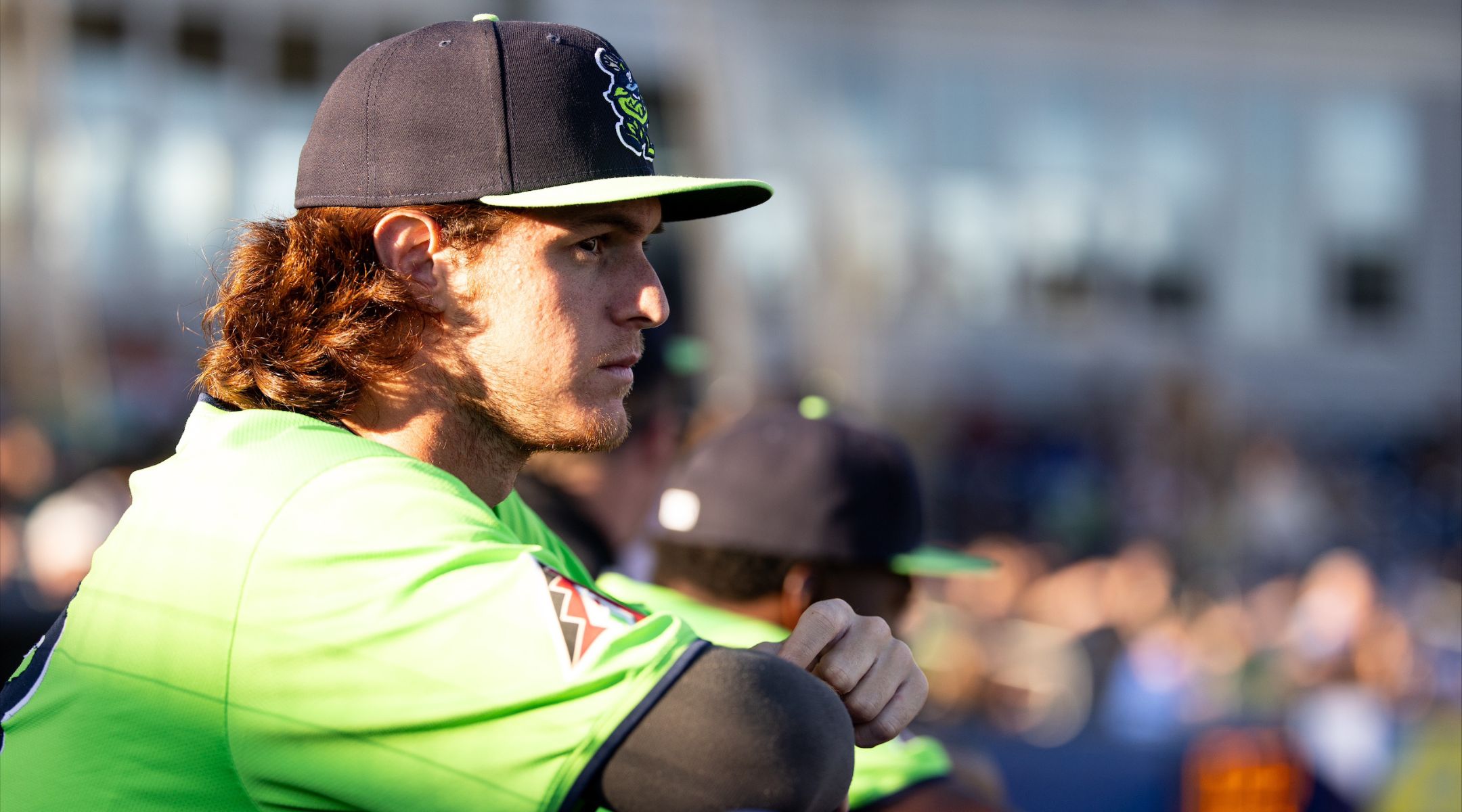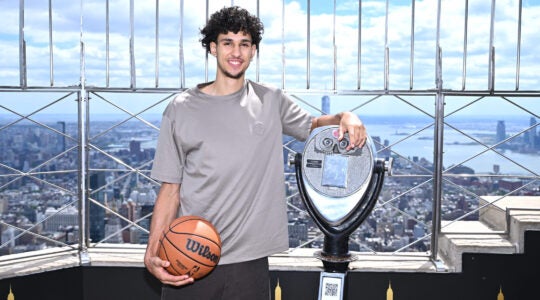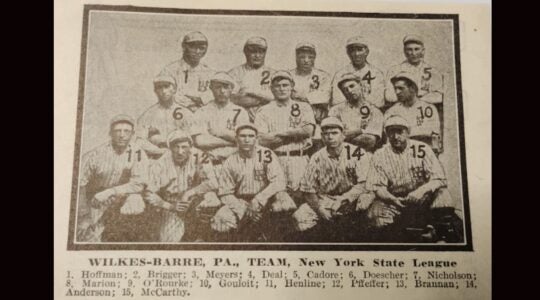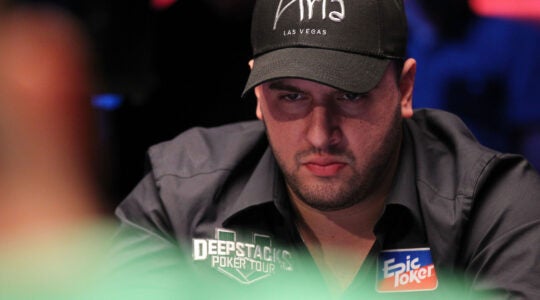As Jacob Steinmetz prepared for his first international road trip as a professional baseball player last week, he had plenty on his plate — literally.
The 20-year-old pitching prospect, who in July 2021 made history as the first Orthodox Jew drafted into MLB, was set to make his third start for the Hillsboro Hops, the Arizona Diamondbacks’ High-A affiliate in Oregon, as they traveled across the border to face the Vancouver Canadians.
But before he could take the mound on Sunday afternoon, Steinmetz had to work out where he’d stay and what he’d eat. Since joining the Diamondbacks’ organization, the team has ordered kosher food for Steinmetz and put him up in hotels near the field so he could walk to practice on Saturdays.
But in Vancouver, there weren’t any hotels within walking distance. And the team was concerned that the kosher food it usually orders for him from the Western Kosher supermarket in Los Angeles would get caught up in customs. So Steinmetz’s family stepped in, helping him find local kosher restaurants and arranging an Airbnb near the ballpark.
The 6-foot-6 righty wasn’t fazed by the logistical hangups.
“I had a kind of expectation going in of it being much harder,” Steinmetz said of being Orthodox in professional baseball. “With [the Diamondbacks] putting all that together, and just being so open and honest about everything, and just so willing to adjust to anything I need, it’s been a lot easier than I could have ever imagined. Thankfully I haven’t had to stress out too much about anything.”
Since being picked 77th overall in the 2021 draft, Steinmetz has been working his way up the many ranks of the Diamondbacks minor league system. He made 12 starts in the rookie-level Arizona Complex League in 2021 and 2022 before being promoted to Low-A last year, where he made 19 appearances with the Visalia Rawhide in central California. He also enjoyed a breakout moment in the 2023 World Baseball Classic with Team Israel, striking out three big leaguers while facing the powerhouse Dominican Republic.
Steinmetz said the initial buzz that accompanied his likely being the first Orthodox Jew to go this far in the minor leagues has begun to wear off.
“I am used to it, so it’s tough to put it into words now,” Steinmetz said. “At first it was definitely very cool, and I think it might have been a little, not pressure, but I kind of wasn’t taking it as seriously. But now I’ve kind of been able to just focus on baseball.”
Even as his uniform and zip code changes, Steinmetz has settled into a unique routine. The organization orders frozen kosher meals that are delivered to wherever he’s playing that week, with a usual rotation including chicken tenders, spaghetti and meatballs and pulled brisket. He orders grape juice from Amazon Prime for Shabbat, and matzah for Passover.

Jacob Steinmetz pitched for Team Israel against the Dominican Republic, March 14, 2023, in Miami. (Dan Passner)
And while the observance has entailed a bit of a learning curve for some of his coaches, Steinmetz said they follow his lead — even if they do sometimes text him on Shabbat.
But they’re understanding, he said, about the times he needs to miss practice or a game because of Jewish religious restrictions.
“There’s definitely some explaining being done,” Steinmetz said. “But at the end of the day, they’re just trusting me with a lot of it. And I don’t take it lightly. Whenever I can be there, I try to be there. Whenever I have a little bit of a dilemma, I’ll tell the coaches and they’ll always say, ‘Hey, whatever you need, don’t worry about that.’”
Minor league teams, especially in Single-A, are often located in rural areas, far from any local Jewish communities or synagogues. Steinmetz sometimes does a quick Shabbat service by himself in his room, and while he pitched on Shavuot last month, he said he avoids playing on Shabbat or Jewish holidays whenever possible.
Being a pitcher who only has to start roughly once a week makes things easier. And he got used to these kinds of makeshift arrangements as a promising teenage player crisscrossing the country with his father, Elliot Steinmetz, the men’s basketball coach at Yeshiva University.
“Especially growing up playing in tournaments where we were kind of in the middle of nowhere, me and my dad, making Shabbos on our own, I’ve definitely gotten used to it,” Steinmetz said.
In the clubhouse, Steinmetz said his teammates occasionally ask questions about his Orthodox lifestyle — particularly about the laws of kashrut and about Shabbat. And, of course, whether McDonald’s has kosher food. (Outside of Israel and Argentina, it does not.)
“I just try to keep it as simple as possible,” Steinmetz said. “I’ll kind of give them the basics, like what makes food kosher. I’ll tell them it’s just how the animal is killed and how the food’s prepared from that point on.”
Steinmetz said his teammates have begun to catch on, and even teach each other.
“There are some times when someone will ask what’s kosher and one of my teammates will be like, ‘Oh, it just means the animal is killed in a certain way, and the food’s prepared in a certain way,’” he said. “And then they’ll look at me and they’re like, ‘Right?’ And I’m like, ‘Yeah, that’s pretty much it.’”
Steinmetz said some of his teammates hail from cities with sizable Jewish communities, like Miami or Memphis, and are used to seeing Jews walk to synagogue on Saturdays. But for others, Judaism is completely foreign.
“There was a kid that I was pretty close with that’s from the middle of nowhere in Indiana that hadn’t met a Jew ever,” Steinmetz said. “So it was a little bit different explaining to him as opposed to some other guys.”
Steinmetz’s top priority, of course, is his game — and that’s improving. He started 2024 with Visalia, posting a 3.60 ERA with 59 strikeouts in 50 innings — solid numbers for a starter — before being promoted to Hillsboro on June 18. He had cut his ERA nearly in half from 2023, while drastically reducing the number of walks he surrendered.
“Last year, I was kind of struggling with command,” Steinmetz said. “Even in outings where I wasn’t walking a lot of guys, I was still falling behind in counts. I think this year I’ve just gotten a lot more confident with all my pitches in the zone, so it kind of allows me to expand more off of that. Just get early contact, get early outs and go deep into games.”
One of Steinmetz’s closest friends in Visalia was his roommate Druw Jones, the 2022 second overall pick and the son of former MLB star Andruw Jones.
“He’s awesome,” Jones told JTA before Steinmetz was called up. “He’s one of my best friends on the team. Just a good guy, a good guy to have around, good vibes all the time.”
Jones, who grew up in a Christian home, said he would frequently ask Steinmetz questions about his Jewish upbringing and practice — though he hadn’t yet tried any Jewish delicacies.
On the field, Steinmetz proudly wears his identity on his sleeve — or more accurately, on his wrist. He has an Israeli flag sewn onto his Rawlings glove and wears an Israeli flag headband under his hat. In addition to reining in his long hair, Steinmetz, who is not very active on social media, said the two accessories are his way of making his voice heard.
“When people see my headband sometimes they’ll be like, ‘Hey, I stand with Israel,’ or ‘Cool headband,’ stuff like that,” he said. “It’s just kind of showing who I am and not hiding from it.”

Steinmetz has represented Israel on the field at the World Baseball Classic and with an Israeli flag patch and headband in the minor leagues. (Joseph Nguyen; Rob Tringali/WBCI/MLB Photos via Getty Images)
Steinmetz’s family was in Israel on Oct. 7 to visit his brother, who was on a gap-year program, but baseball obligations kept Jacob from joining them. He returned home to Woodmere, New York, from Arizona on Oct. 6 and spent the holidays of Shemini Atzeret and Simchat Torah with family and friends. Like many Orthodox Jews, he heard about the Hamas attack only after the holidays ended.
“We obviously heard about it through shul, and nobody really knew what was happening until we all turned our phones on after,” Steinmetz recalled. His thoughts immediately went to his family. “I saw a text pop up that said they were fine,” he said.
In the months since, Steinmetz said the Israel-Hamas war has rarely come up in conversations with his teammates.
“No one’s said anything outright antisemitic or anti-Zionist or anything like that,” he said. “I’ve only heard words of support and stuff like that. It just isn’t talked about as much.”
Steinmetz’s family watches his starts online and occasionally travels to see him pitch — including an early June game in Rancho Cucamonga, California, where Steinmetz’s father, grandfather and a handful of family friends made the trip for what proved to be his penultimate start with the Rawhide.
“It’s fun to watch your kids work hard at something and then succeed in it,” Elliot Steinmetz told JTA. “Watching him and knowing how hard he works at it, how much it means to him, and to see him out there, obviously enjoying it and getting better at it every day, it means a lot. It’s awesome. I’m proud of him.”
Elliot said he attended two of his son’s starts last year, and two so far this season. The Rancho Cucamonga start was the first in-person game of the year for Michael Steinmetz, Jacob’s grandfather.
“It’s very special,” Michael Steinmetz told JTA. “He’s worked very, very hard for this. He’s always believed that he could do this and keep his faith and keep his observance. And he’s working very hard to prove that, I think on both ends. I’m very proud of him.”
The elder Steinmetz also referenced fellow Orthodox athletes — and friends of Jacob’s — Elie Kligman, who was drafted after Steinmetz in 2021, and Ryan Turell, the former Y.U. basketball star who spent the past two seasons in the NBA’s minor league.
“I think it’s great that he’s first, that he’s blazing a trail, that he’s proved to people that we can do it,” Michael Steinmetz said. “We’re regular people, and he’s just trying to prove that.”
Turell, who played for Elliot Steinmetz at Yeshiva, has also been to a few of Steinmetz’s games, and the pair catch up occasionally in L.A., where Turell grew up. Steinmetz said they’ve discussed their parallel paths as Orthodox professional athletes.
“I’ve asked him about it a couple times. It does sound kind of similar to me,” Steinmetz said. “He’s walking in the middle of nowhere and stuff like that. And obviously, it’s a little different and more difficult in the G League because they’re playing every day.”
Back home on Long Island, Steinmetz’s success has turned him into a celebrity of sorts.
“When I got home in the offseason, and I’d go to synagogue on Saturdays, there’s kids coming over, just saying what’s up,” Steinmetz said. “And kind of looking at me like I’m some whatever, even though I’ve been going to that same synagogue for 17 years.”
But he gets why younger kids want to meet the Orthodox pitcher who could one day make the majors. He said, “It’s definitely cool for them to see that there is someone that does it.”
JTA has documented Jewish history in real-time for over a century. Keep our journalism strong by joining us in supporting independent, award-winning reporting.






